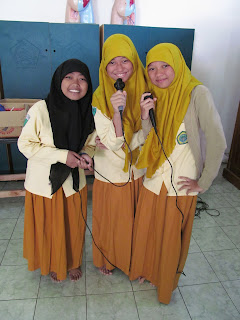One of the newer young teachers at MBI is a very
motivated woman nicknamed Bella. Today
she was to work with the choir groups.
The girls' group would have a competition on Saturday. They needed to have a good final practice
today. It would turn out to be the boys’
practice day as well, however their competition wouldn’t be until Sunday. Since the visiting and observing of classes,
by now, seemed to be a decision left up to Nancy and me, I decided to spend time with the
choir classes. The first thing necessary
was the finding of a space to use. A
room was found, but needed to be cleared and cleaned. Sound equipment was brought in and set
up. Students and teachers struggled with the equipment. Only some of the mics worked consistently.
 |
| These girls were ready to begin before the remainder of the choir arrived. |
 |
| The piece begins with a traditional, melodic sound, but mixes in a little beat-boxing and catchy rhythm. |
 |
| The boys' choir group's competition is not eminent, so they goof around a bit more than the girls. |
Because I am American, and these teens listen to and know how to sing many American songs, they serenaded me with a couple of familiar favorites. My students will really connect with them.
Perhaps one surprising thing for me this day was that the music the students and teachers chose was fun and foot-tappingly addictive. Since I agreed to show the videos only to my students, I won't post them here, but you can find the American songs they sang at these links: Second Hand Serenade, Fall for You, and Adele's, Someone Like You.
















